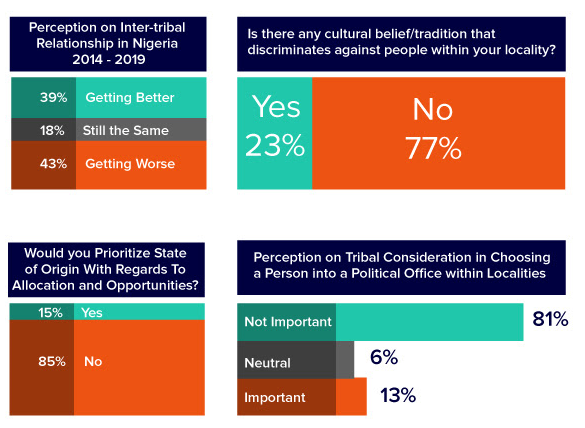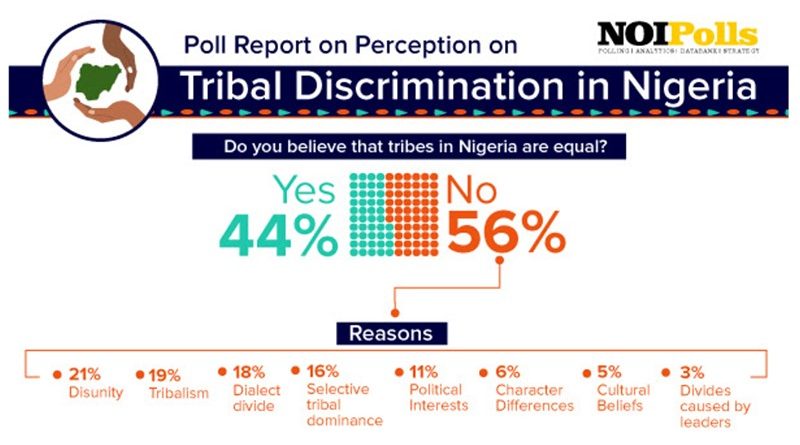Poll Report on Perception on Tribal Discrimination in Nigeria – NOIPolls
A public opinion poll conducted by NOIPolls revealed at least one in every two Nigerian has been a victim of tribal discrimination or know someone who has been a victim. The survey also showed that more Nigerians attributed the problem of tribal inequality to ‘lack of unity’ amongst the Nigerian people. The figures from the poll indicate that, out of the total population of Nigerians, 44 percent feel that all tribes are equal, while a significant proportion (56 percent) of the population feel that all tribes are not equal. The reason for the variations in opinion being largely attributable to fact that ‘Nigerians have equal rights as humans’ and ‘lack of unity’ respectively.
Figures from the poll indicate that the problem of tribal discrimination is getting worse, as the level of inter-tribal relationship in Nigeria 5 years ago, compared to now, is viewed by 43 percent of the population of the country to be worse. It is also interesting to know that 41 percent of Nigerians feel that no attention is really given to this menace in our society.
Therefore, to address this issue in Nigeria and reach the ultimate goal of national unity, it is necessary for all level of government to unite people in many aspects of life as possible especially on governmental and social level. For instance, economic cooperation, youth education, political and state cooperation, inter-tribal marriages and secular activities such as national festivals, celebration, introducing traditional holidays can go a long way in solving tribal discrimination

Survey Background
Right to freedom from discrimination is one of the fundamental rights of every citizen in Nigeria as enshrined in Chapter IV of the Constitution of the Federal Republic of Nigeria, 1999 (as amended) and the section provides that;
‘A citizen of Nigeria of a particular community, ethnic group, place of origin, sex, religion or political opinion shall not, by reason that he is such a person be subject to any disability or deprivation merely by reason of the circumstances of his birth.’
According to statistics, youth unemployment rate is very high, there is lack of health care facilities and high crime rate. In spite of all these, the youth who are supposed to be at the fore front of change and development campaigns are sometimes vulnerable to different forms of discrimination.
Nigeria emerged after independence in 1960 as one of the main powers on the African continent and even dominated the political, economic and social arenas in Africa. Nigeria also contributed greatly in the founding of the Organization of Africa Unity (now AU) in 1963 as well as its persistent fight against white rule in Africa. Further in 1975, Nigeria also played a very important role in establishing the Economic Community of West African States (ECOWAS) to foster trade relations and cooperation amongst the countries found on the Western part of Africa.[1]
However, Nigeria went through a civil war between 1967 and 1970, that left millions of people dead and the hope of a great and rising nation, dimmed. Undeniably, the country has come far since that war, but it is also clear that more could have been achieved in terms of national integration.
As an effort to maintain a united Nigeria, the Federal Character was enshrined in Nigeria’s constitution since 1979 to ensure that appointments to public service institutions fairly reflect the linguistic, ethnic, religious, and geographic diversity of the country.[2] Given the above background, NOIPolls conducted a survey to ascertain the perception of Nigerian citizens and residents regarding the issue of tribal discrimination, as it affects gender, age-group, geo-political zones, and occupation of respondents. It also sought for the varying opinions of citizens regarding the level of attention paid to the improvement of inter-tribal relationship in Nigeria.
Survey Findings
The poll sought to determine and ascertain the perception of Nigerians regarding tribal discrimination (i.e. the equality of rights of the various tribes) in the country and the analysis of the survey revealed that 44 percent of Nigerians nationwide, stated that all tribes in Nigeria are equal; while 56 percent of this proportion are of the view that all tribes in Nigeria are unequal. Clearly, the picture painted here is that about 56 percent of Nigerians nationwide seem to suggest that tribal discrimination holds sway in the country.
Analysis across geo-political zones revealed that the North-West and South-West regions (51 percent each) had the highest proportion of Nigerians who believed that all tribes in Nigeria are treated equally. On the other hand, the South-East region (70 percent) had the highest percentage of Nigerians that stated that all tribes in Nigeria are not treated equally. It is important to state that the South-East is the region that was at the centre of the Civil War that engulfed Nigeria between the years 1967-1970.

Furthermore, the poll sought to ascertain the various reasons for tribal discrimination in Nigeria nationwide. The analysis of the survey revealed that the common cause of tribal inequality is lack of unity with a proportion of 21 percent of Nigerians of the view that that is chief among the root causes

An analysis of the rationale underpinning the perception of the 45 percent of the respondents that believe that all tribes are equal shows that the most respondents believe that Nigerians have equal rights.

Inquiries were made to contrast and compare the level of inter-tribal relationship in Nigeria currently with what was obtained 5 years ago and findings revealed that 43 percent of the Nigerian population perceive that the level of inter-tribal relationship in Nigeria is getting worse. However, 39 percent claimed that it is getting worse.
The respondents from the North-West geopolitical zone (61 percent) are of the opinion that the level of inter-tribal relationship is getting better, compared to 5 years ago. The South-East zone (15 percent) had the lowest percentage of Nigerians in this category. At 29 percent, respondents from the South-West region, had the highest percentage of all Nigerians that believed that the level of inter-tribal relationship in their immediate environment remained the same. The South-East region believes that inter-tribal relationship in their environment is getting worse compared to 5 years ago.

Progressively, the survey sought to determine the extent of attention given to the improvement of inter-tribal relationship in Nigeria and survey results revealed that 41 percent of the population of the country believed and stated their opinion that ‘to no extent at all’ is attention given to the improvement of inter-tribal relationship in Nigeria. 38 percent of Nigerians think that it is only ‘to some extent’ while 21 percent believe that attention is given to the improvement of inter-tribal relationship in the country ‘to a large extent’.
The result of the poll revealed that the North-West zone (41 percent) are of the opinion that attention is given to improvement of inter-tribal relationship. Furthermore, the poll results revealed that the South-East zone (68 percent) believe that ‘to no extent at all’ is attention given to the improvement of inter-tribal relationship in their immediate environment.

The poll also sought to understand whether any of the respondents have ever experienced or know of anyone who had ever experienced tribal discrimination. The results of the survey revealed that 43 percent of the Nigerian population have experienced/know persons who have experienced tribal discrimination. However, 57 percent of the Nigerians stated that they have not experienced or know of anyone who have experienced tribal discrimination.
Analysis of the survey results revealed that 61 percent of Nigerians from the South-East region have either had experience or know persons who have had personal experience of tribal discrimination. The South-West zone (34 percent) had the lowest percentage of Nigerians who have or know persons that have experienced tribal discrimination.

The poll sought to determine and ascertain whether Nigerians have or know of anyone who has ever experienced opposition regarding inter-ethnic marriage and the analysis of the survey revealed that 48 percent of Nigerians nationwide, stated that they either have or know of persons who have experienced opposition regarding inter-ethnic marriage. On the contrary, 52 percent claimed that they have not nor know of persons who have experienced opposition regarding inter-ethnic marriage.
Further analysis along geo-political zones indicated that nationwide, South-East (54 percent), North-East (53 percent) and South-South (50 percent) accounted for the zones where majority of Nigerians claimed to have or know of persons who have experienced opposition regarding inter-ethnic marriage. Whereas, the North-East (58 percent), South-West (54 percent) and North-Central (49 percent) accounted for the zones where majority of Nigerians stated that they have neither experienced nor know of anyone who have experienced opposition regarding inter-ethnic marriage.

In conclusion, with regards to tribal discrimination in Nigeria, the survey revealed that 56 percent of Nigerians still feel the sting of tribal discrimination and hence believe that all tribes are not equal in the country. The perception of discrimination varies in degrees with respect to age group, gender, geo-political zones, occupation etc. One of the reasons for this perception is lack of unity.
Tribal discrimination is a negative factor that is foiling the progress hoped for by the Nigerian people as regards nation-building. Overtime, many Nigerian leaders at various levels have been perceived to be tribally discriminatory. This fuels distrust among their followers. The constant reference to tribal animosities and differences affects the psyche of the youths and has created a pattern or legacy of hate and suspicion which the successive generation carries along. The national conference held in 2014 was geared towards resolving the country’s diversity to make it work. It is, therefore, imperative that some decisions reached at that conference should be given attention.
The survival of Nigeria hangs in the balance if Nigerians in position of authority do not proactively come together, and look beyond tribal, religious and party affiliations in addressing our national issues. Interestingly, even bigoted leaders know how to shake hands across tribal divide but are good at sowing seeds of discord among their followers, to achieve a political end.
One of the ways out of tribal discrimination in Nigeria is cultural reorientation on the beauty of diversity. The results of the survey are a call on all Nigerians to focus on addressing the human factors that are contributing to conflicts, underdevelopment and bad governance as against vilifying the beauty of their diversities. We also need to set up effective organisations that will serve as check and balance on governments at various levels, particularly in respect to institutional discrimination. Also, government at all level should encourage economic cooperation, youth education, political and state cooperation, inter-tribal marriages and secular activities such as national festivals, celebration, introducing traditional holidays as a way of solving tribal discrimination in the country.
Finally, based on the 77 percentage of Nigerians who affirmed that there is no belief or tradition in their locality or tribe that reinforces discrimination against people from other locality or tribe, it is reassuring that there just might be a glimmer of hope for better inter-tribal relations in the near future. Undeniably, more still needs to be done to sensitize Nigerians on the benefits and merits of national unity which is the canopy effect of inter-tribal relations. Hence, the Federal government through the National Orientation Agency (NOA), traditional leaders, religious bodies and National Media outlets should make concerted effort in reinforcing the need to dump discrimination and embrace inter-tribal unity.
METHODOLOGY
The survey was conducted in October 2018 and it involved telephone interviews of a proportionate nationwide sample of 1,000 randomly selected phone-owning female Nigerians aged 18 years and above, representing the six geo-political regions and 36 states and the FCT of the country. Interviews were conducted in 5 languages – Igbo, Hausa, Yoruba, Pidgin English and English. Although we can say with 95% confidence that the results obtained were statistically precise – within a margin of error of plus or minus 4.65%; we recognize that the exclusive use of telephone polling has its limitation of excluding non-phone-owning Nigerians. Nonetheless, with the country’s tele density put over 100 percent by the Nigerian Communications Commission (NCC), we consider our telephone polling approach appropriate. Also, given the rigorous scientific process of randomization and stratification applied, we can confidently stand by the validity of our methodology and approach. NOIPolls Limited, No1 for country specific polling services in West Africa. We conduct periodic opinion polls and studies on various socio-economic and political issues in Nigeria.
Disclaimer
This press release has been produced by NOIPolls Limited to provide information on all issues which form the subject matter of the document. Kindly note that while we are willing to share results from our polls with the general public, we only request that NOIPolls be acknowledged as author whenever and wherever our poll results are used, cited or published.
NOIPolls hereby certifies that all the views expressed in this document accurately reflect its views of respondents surveyed for the poll, and background information is based on information from various sources that it believes are reliable; however, no representation is made that it is accurate or complete. Whilst reasonable care has been taken in preparing this document, no responsibility or liability is accepted for errors or fact or for any views expressed herein by NOIPolls for actions taken as a result of information provided in this report. Any ratings, forecasts, estimates, opinions or views herein constitute a judgment as at the date of this document. If the date of this document is not current, the views and content may not reflect NOIPolls’ current findings and/or thinking.



